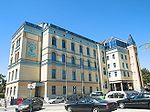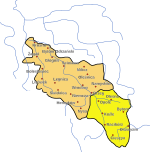Public Higher Medical Professional School in Opole
Europe university stubsOpolePolish school stubsUniversities and colleges in OpoleUniversities and colleges in Poland

The Opole Medical School (Polish name: PMWSZ - Państwowa Medyczna Wyższa Szkoła Zawodowa) is a state-owned medical school in Opole. The school was established on 1 May 2003. PMWSZ teaches in the following areas: obstetrics nursing physiotherapy public health cosmetologyand, with the consent of the Ministry of Science and Higher Education of the Republic of Poland: medical emergencyRector: Tomasz Halski, MD, PhD
Excerpt from the Wikipedia article Public Higher Medical Professional School in Opole (License: CC BY-SA 3.0, Authors, Images).Public Higher Medical Professional School in Opole
Augustyna Kośnego, Opole Śródmieście
Geographical coordinates (GPS) Address Nearby Places Show on map
Geographical coordinates (GPS)
| Latitude | Longitude |
|---|---|
| N 50.67 ° | E 17.936111111111 ° |
Address
Augustyna Kośnego 48
45-372 Opole, Śródmieście
Opole Voivodeship, Poland
Open on Google Maps










